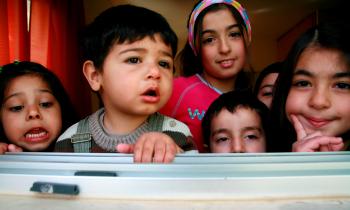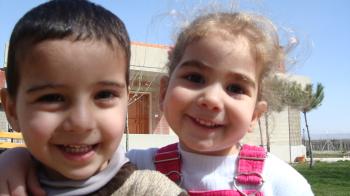An isolated region that lives off agriculture

The small town of Ksarnaba is located in central-eastern Lebanon in the Bekaa Governorate, which spans over 40 per cent of Lebanon’s land area but is home to just 12.5 per cent of the population. Ksarnaba has fewer than 3,000 inhabitants, and the region is predominantly agricultural.
Ksarnaba is one of the most isolated and neglected regions of the country. Due to its mountainous terrain and limited road access, many towns in the region are geographically quite isolated and government presence has traditionally been minimal here.
Families living in challenging conditions
Families in the area often live in crowded housing, without access to sanitation facilities or fresh drinking water. Women have 5.4 children on average, but most families live in just two rooms.
A 2012 report by the International Labour Organisation stated that up to 36 per cent of children in Bekaa cannot read or write and almost 70 per cent do not attend school. Many children drop out of school in order to work in agriculture.
The Bekaa Governorate borders Syria and over 373,000 refugees are officially registered with the United Nations. Their arrival has put a strain on services which were already struggling to meet local needs. International aid is helping to alleviate the situation for both refugees and the many vulnerable Lebanese families in the area.
What we do in Ksarnaba

Strengthen families: We work hard to ensure that families can stay together. We provided access to health care, as well as educational and psychological support. In 2014, we supported 737 children from 207 families in the neighbourhood. 16 families became independent: they set up catering services, sold groceries and clothes or offered cleaning services.
Family-based care: Children from the region who have lost parental care can find a loving home in one of ten SOS families. In each family, brothers and sisters grow up together, affectionately cared for by their SOS mother.
Many of the children who come to live with us have had very traumatic experiences. We provide psychological care and other therapies, as well as extra tuition for those struggling at school. We organise special events where children can further their social and creative skills.
Education: Children between 18 months and six years go to the SOS Kindergarten together with children from the neighbourhood, ensuring that they make friends and are part of the local community from a young age. Arabic, French and English are spoken at kindergarten.
Support to young adults: Young people, who are ready to move out of their SOS families, move into special accommodation. Girls and boys live in different houses and continue with their schooling or training. SOS Children's Villages gives them psychological and educational support and will help them look for work so that they can live independently.
Support to refugees: Due to the large number of Syrian refugees arriving in the area, SOS Children's Villages has provided assistant in the form of medical care, as well as food, clothes and toys for children.